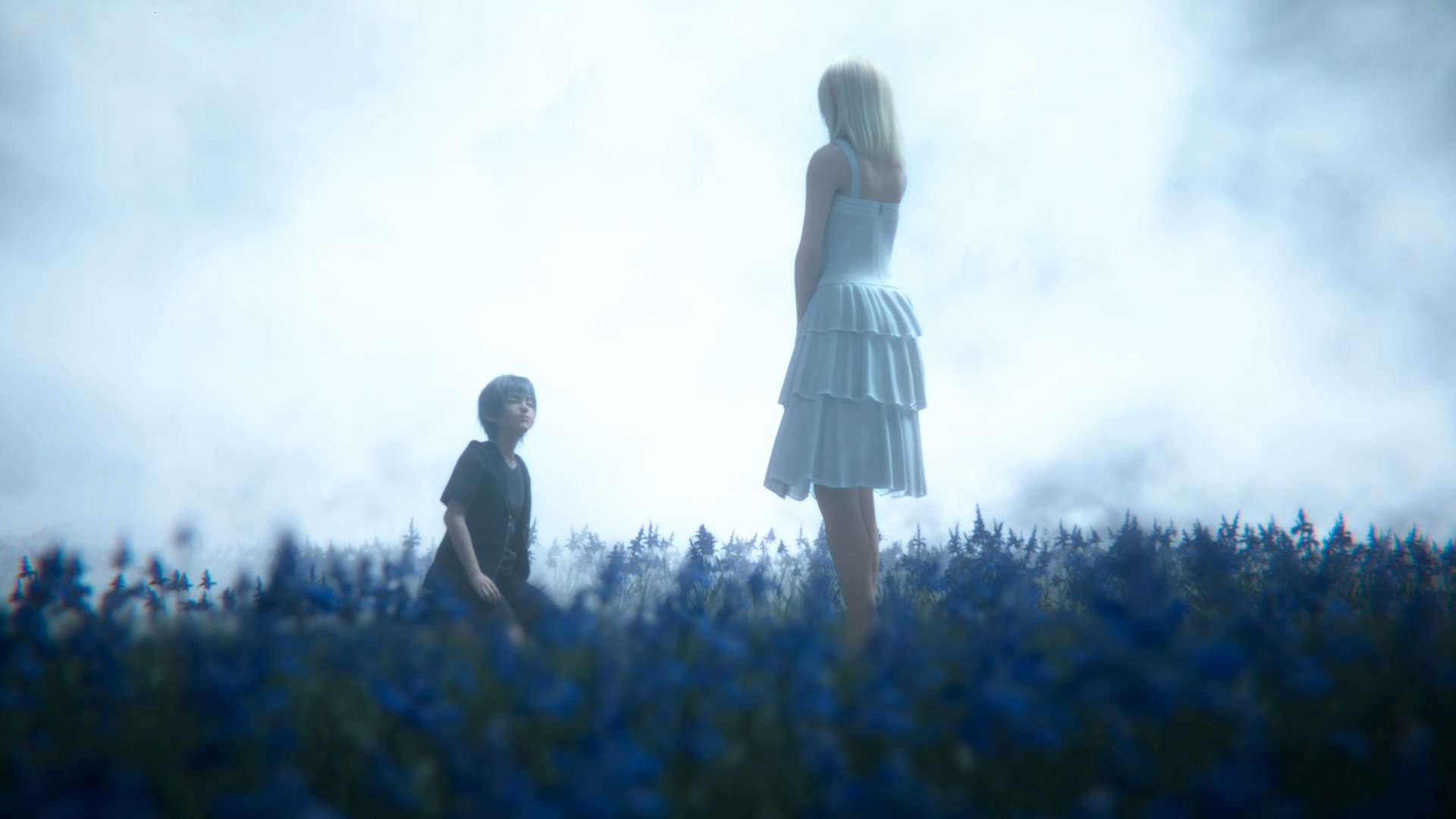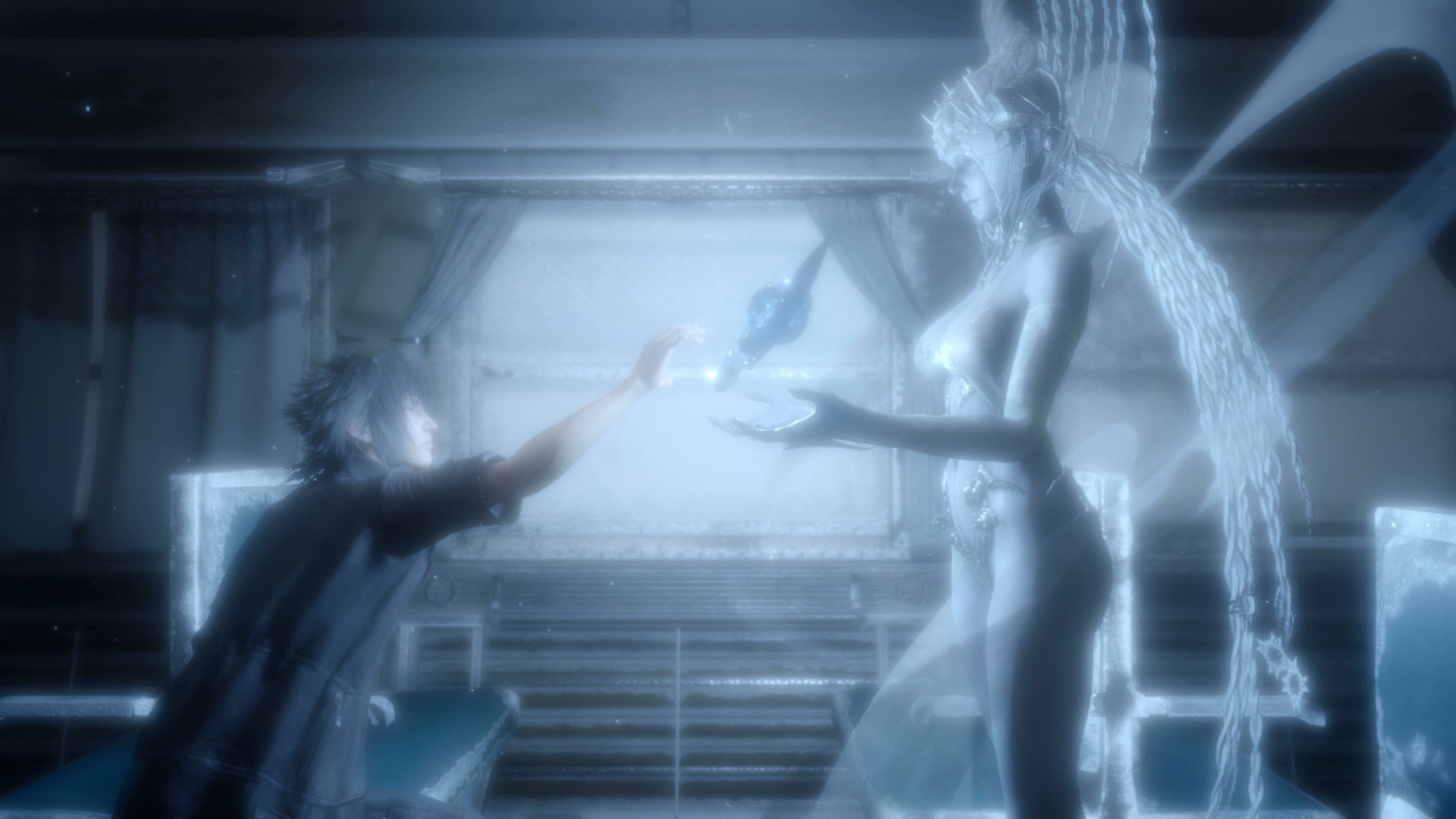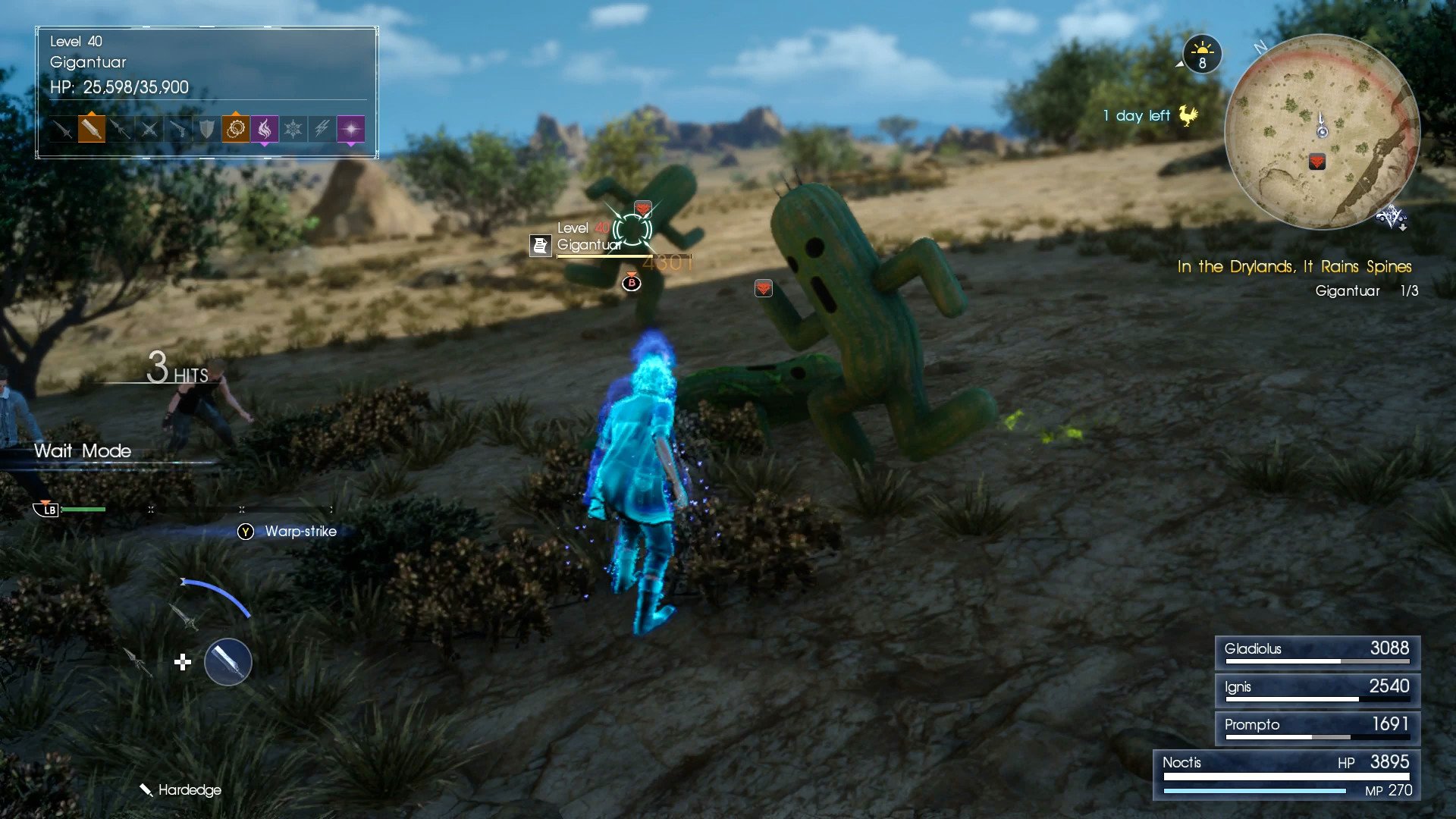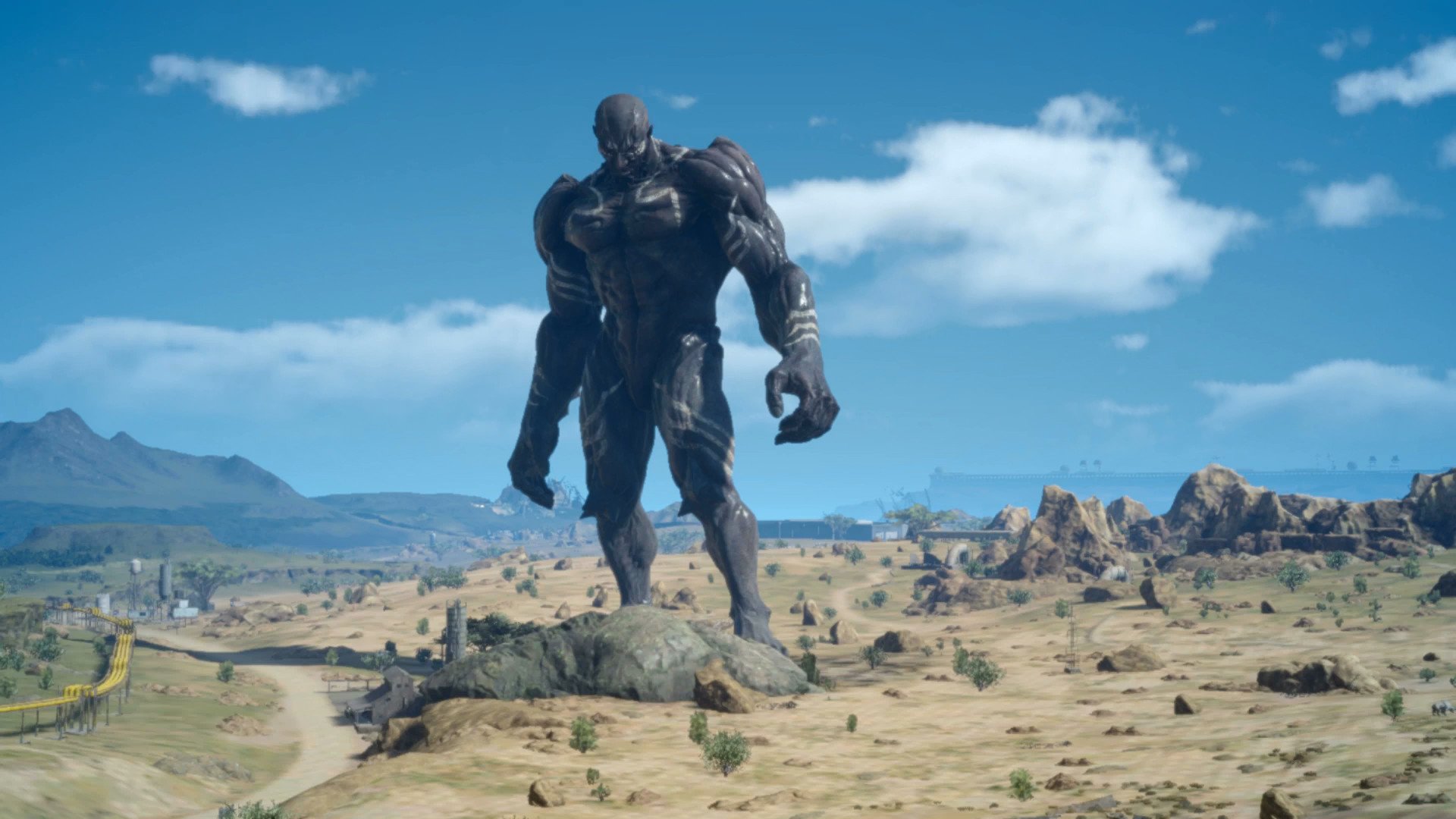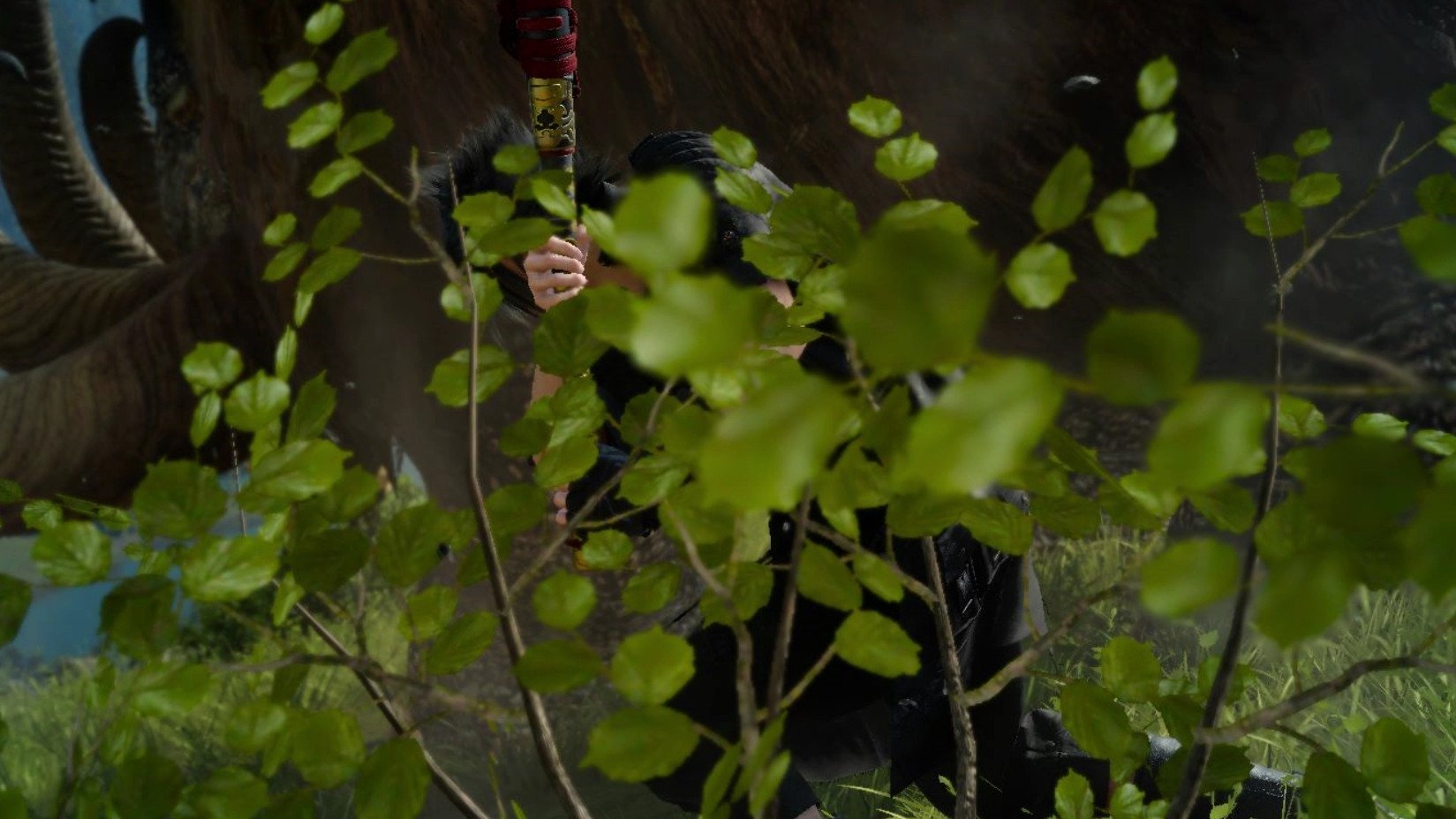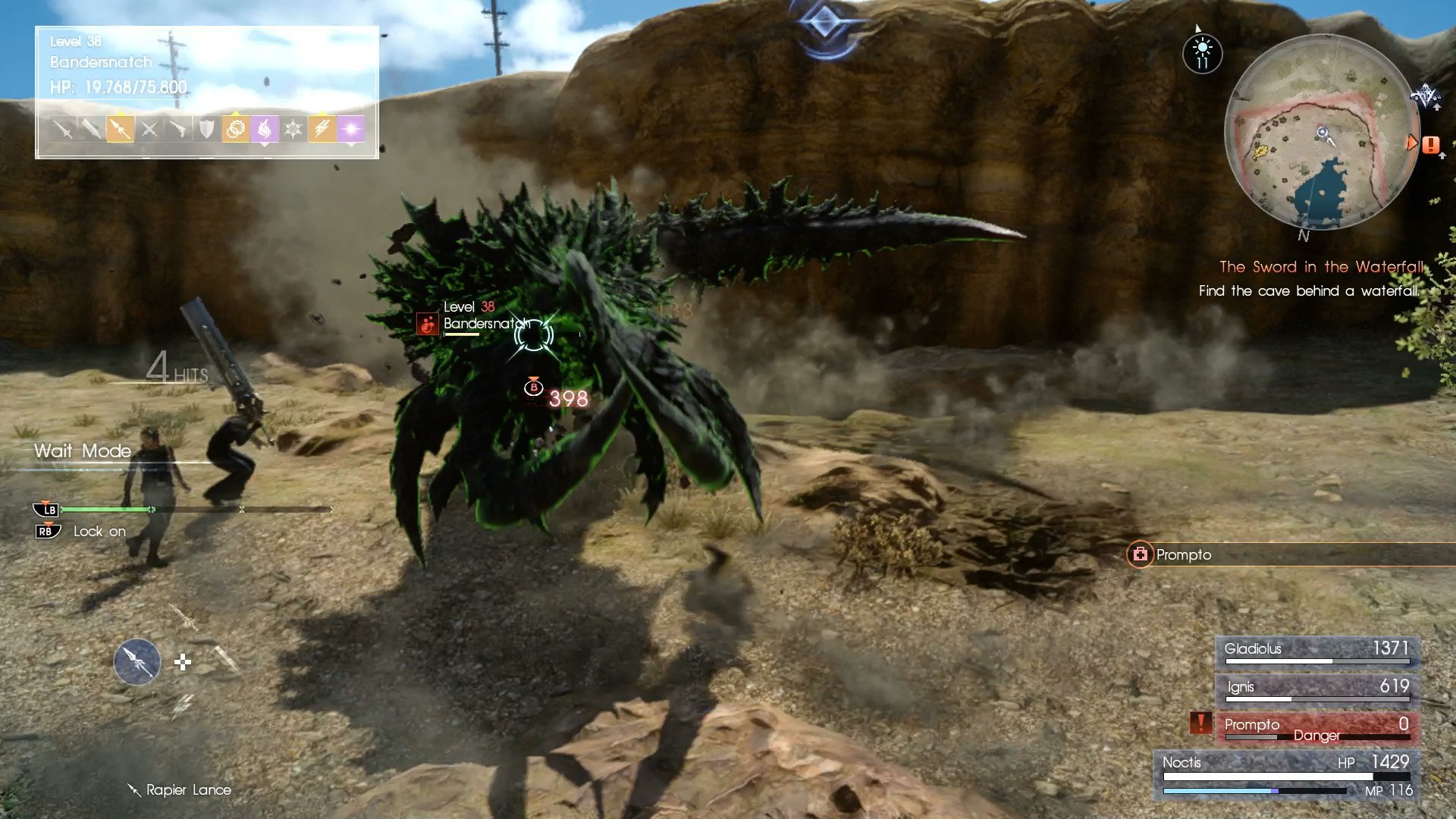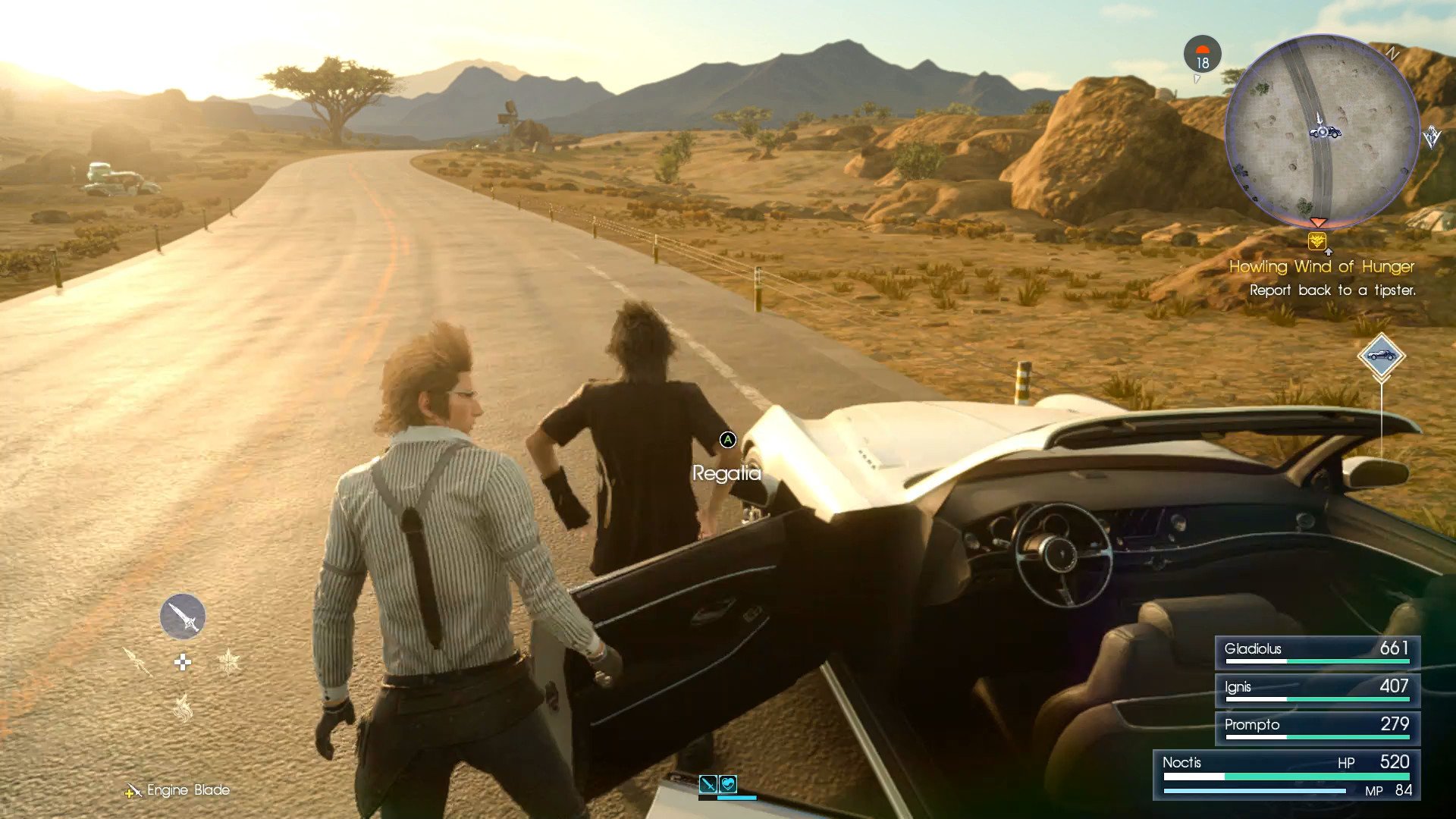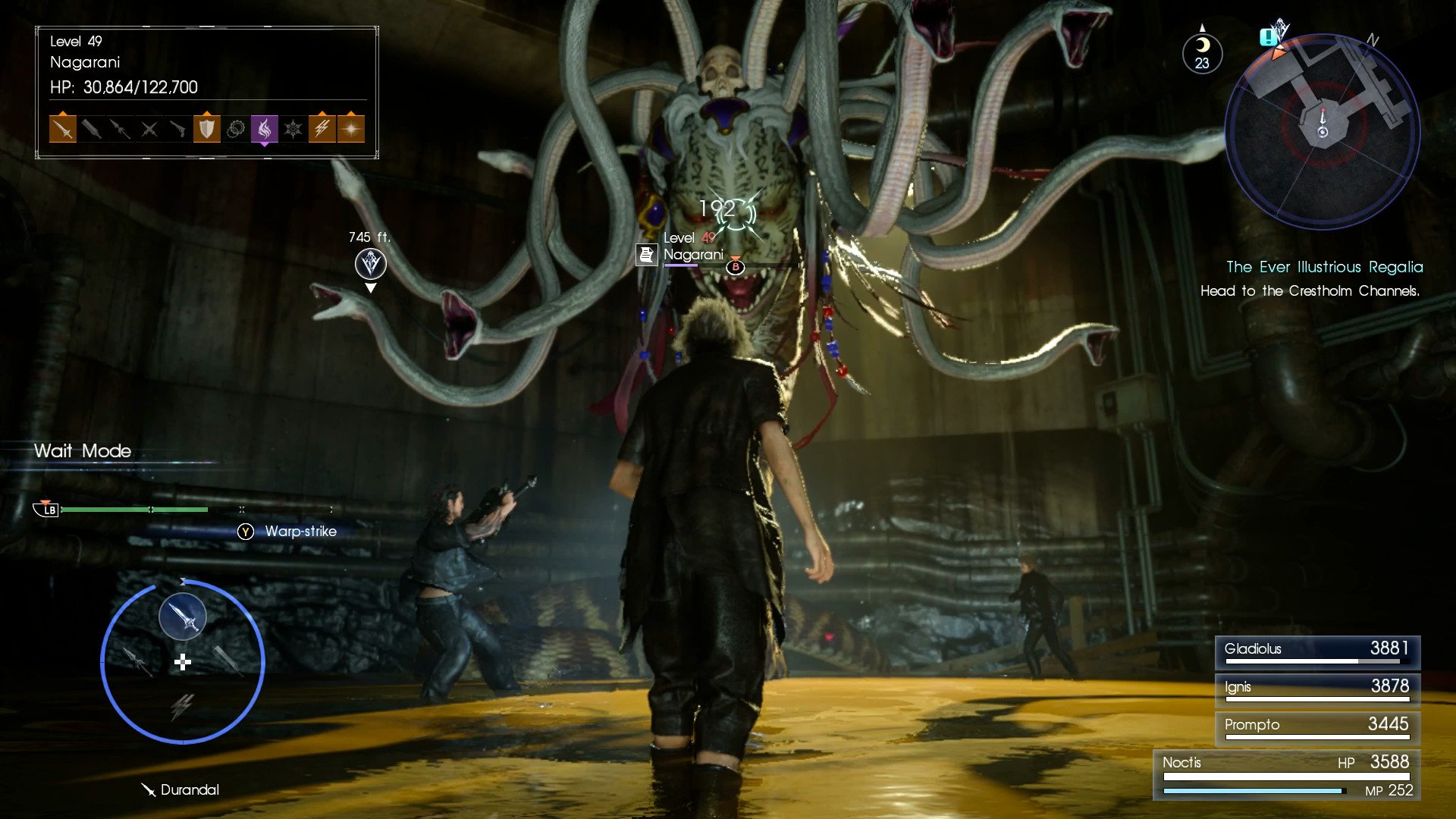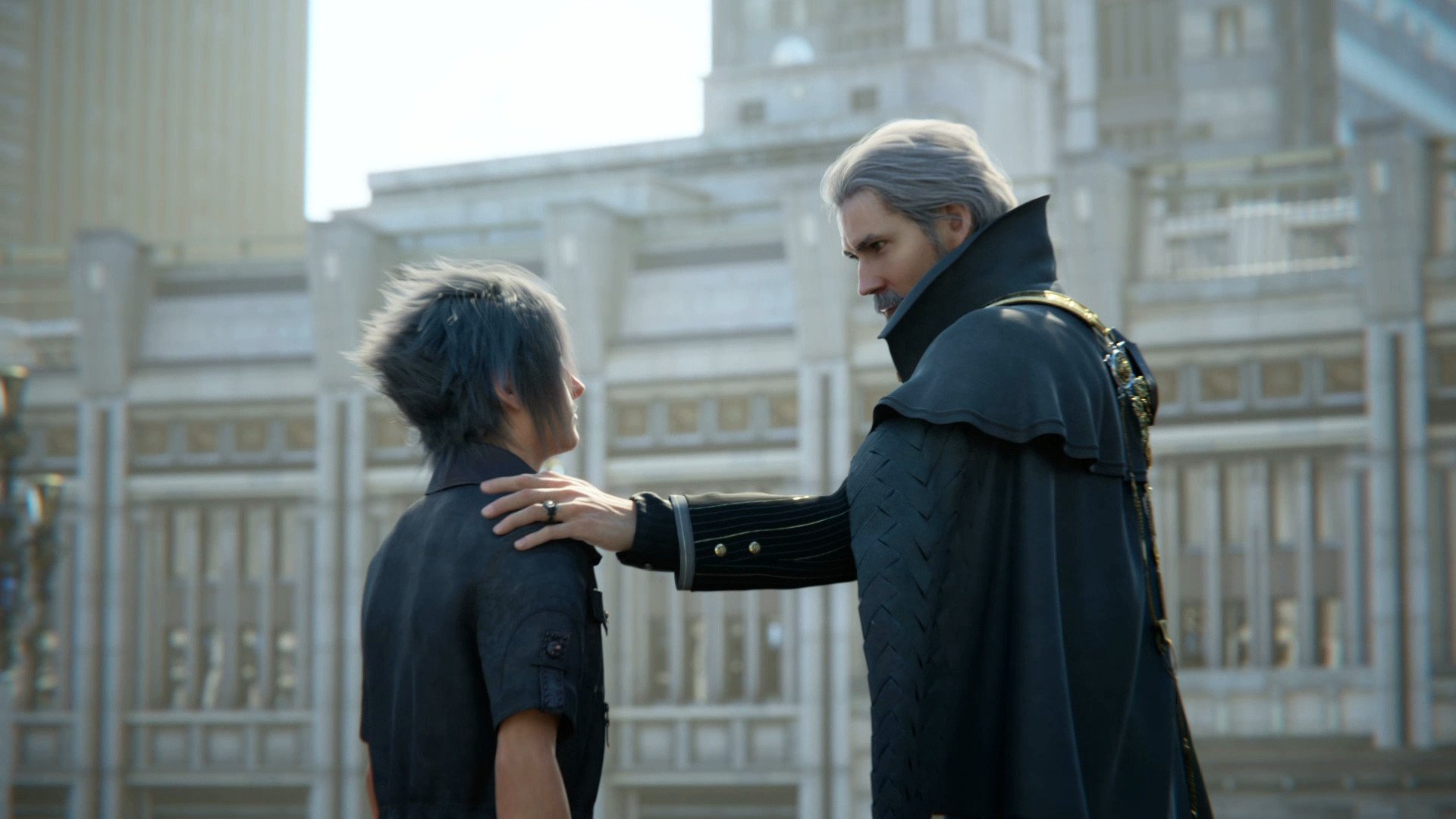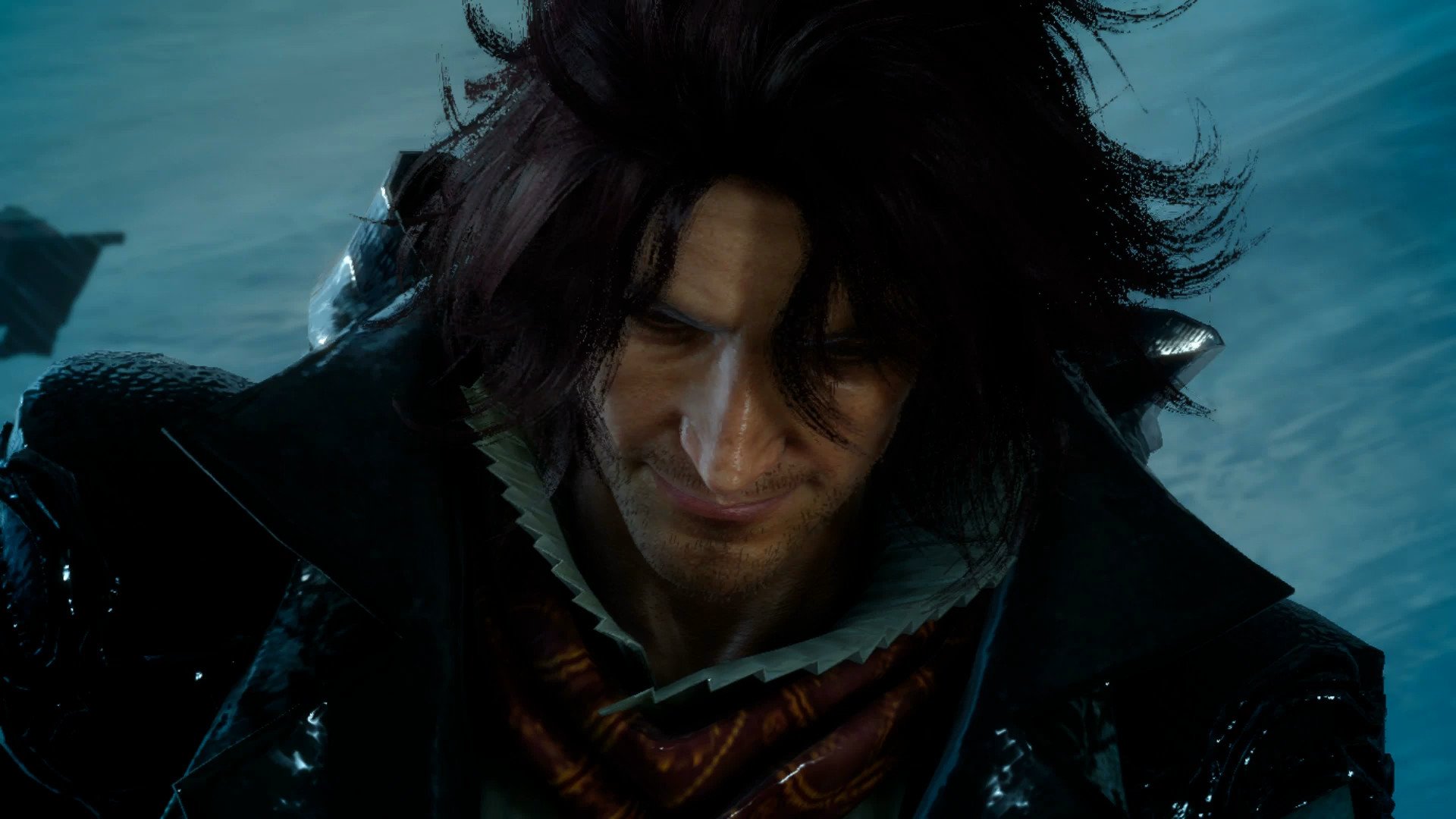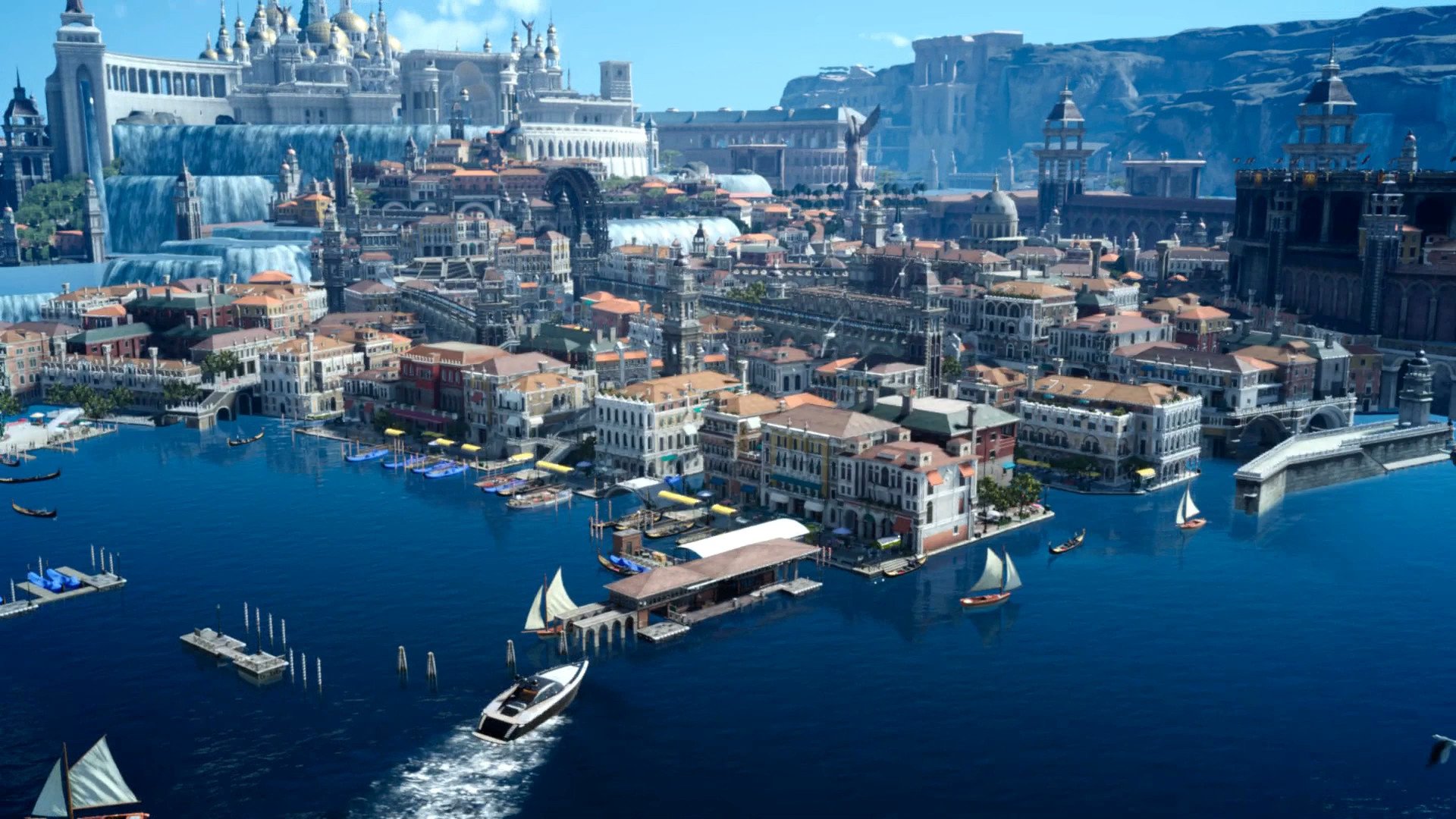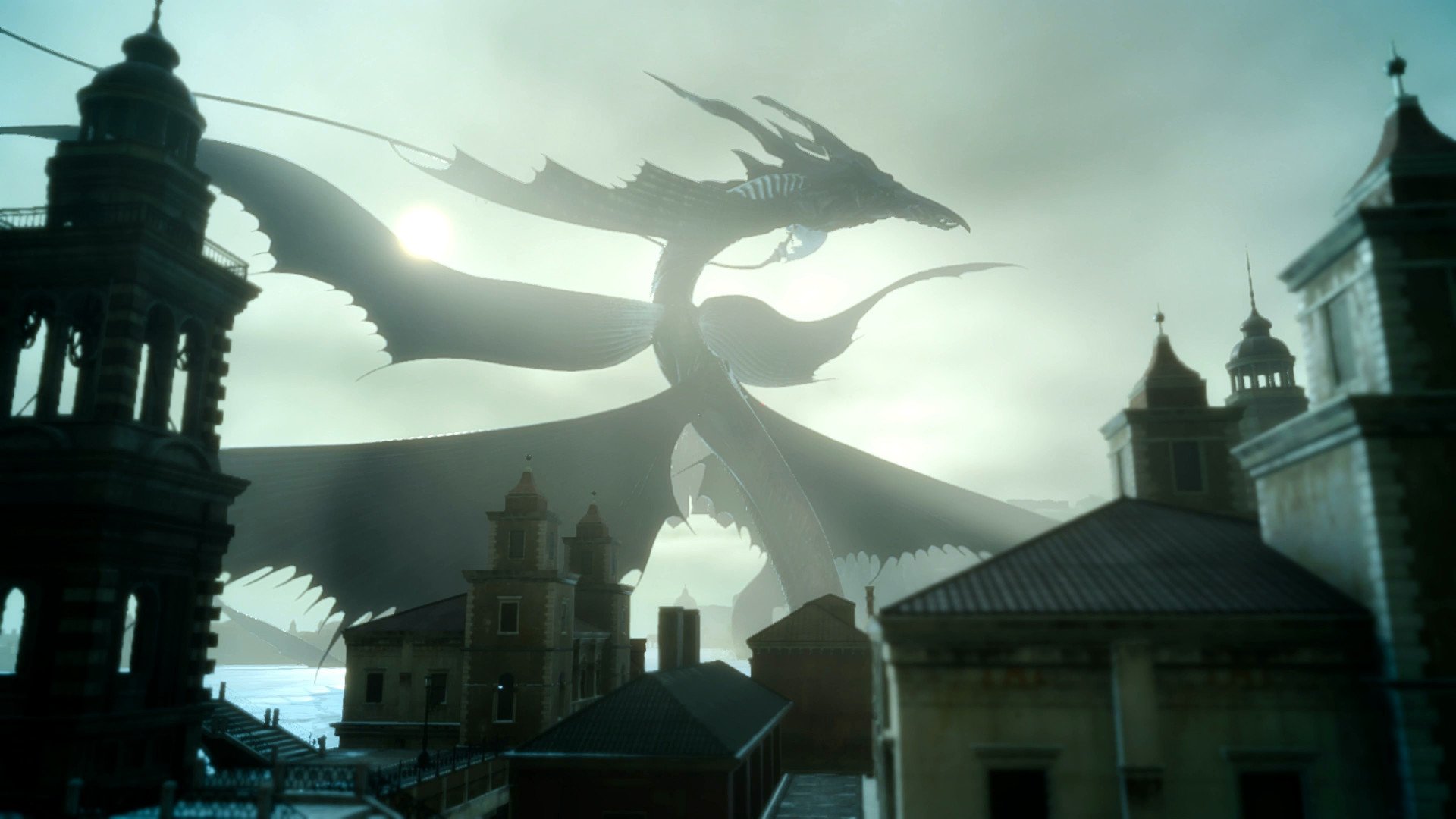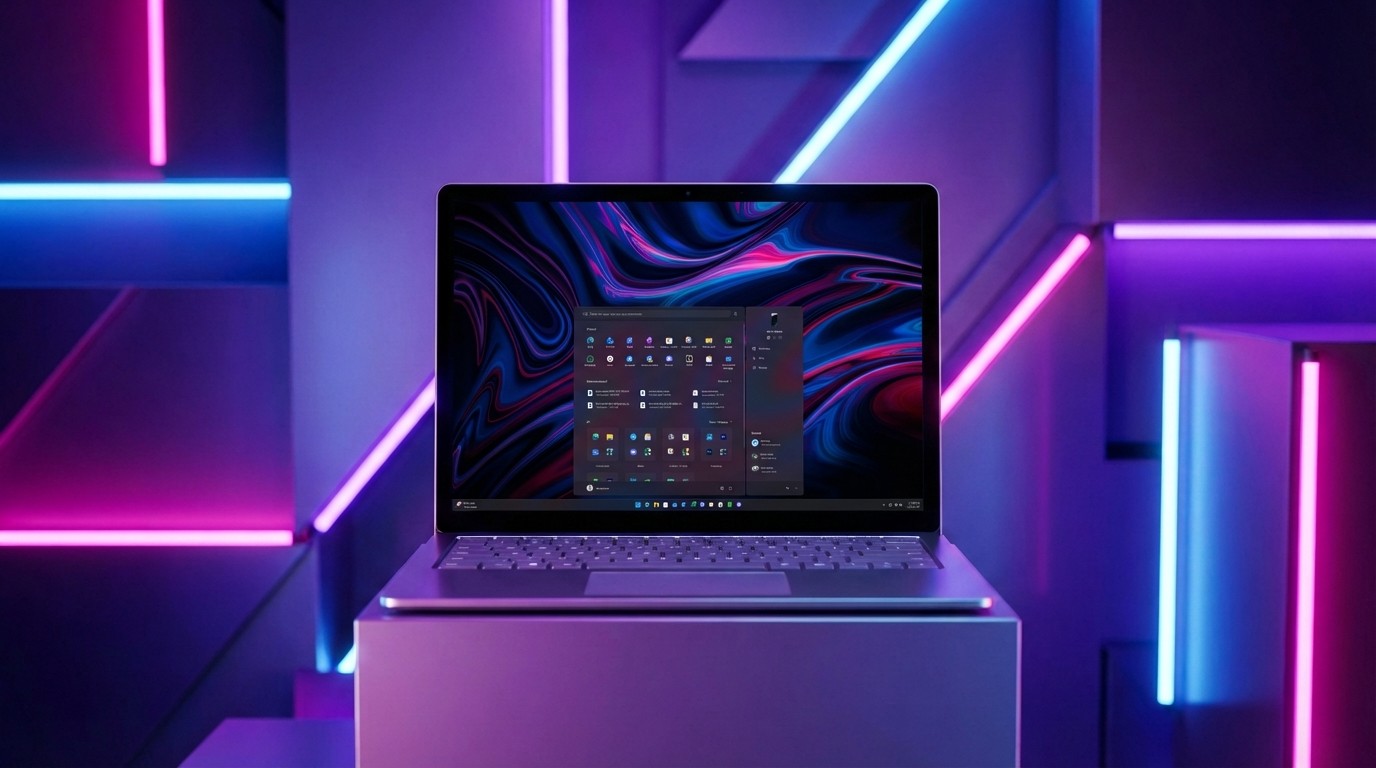I already offered my initial impressions but I wanted to go the full distance before writing the main review. Final Fantasy games are always huge, but I feel as though the way the game played out towards the end has affected the way I see the game. I'm happy to recommend Final Fantasy XV right now to all sorts of gamers.
Overall, it has been a wonderful experience as a long time Final Fantasy fan, but Square Enix cannot afford to become complacent with the franchise's future. This game is not perfect.
Final Fantasy XV is an RPG over ten years in the making. Square Enix initially built FFXV to be a spin on Final Fantasy XIII, dubbed Final Fantasy XIII Versus. Due to the expanding scale of the project, however, FFXV became a core entry in the numbered series, which will enjoy its 30th birthday in 2017.
Final Fantasy XV is a story-driven experience featuring real-time combat in a vast open world, and it's self-described as a Final Fantasy for fans and newcomers alike. After completing the game, I think Square Enix mostly accomplished this aim.
Final Fantasy XV is available now on Xbox One and PlayStation 4.
Gorgeous art, ugly tech
All the latest news, reviews, and guides for Windows and Xbox diehards.
Visuals & Design
On Xbox One, Final Fantasy XV is a mix of amazing art and technical issues. The art direction is stunningly gorgeous. The modern take on classic Final Fantasy creatures like the Malboro, the Catoplebas, the Behemoth, are nothing short of astounding. The designs in Final Fantasy XV are among the most imaginative and evocative in the series. Summoning Ramuh, seeing the weather effects change and the dynamically integrated musical choir chime in, is a jaw-dropping experience every time, and it's made all the more impressive by the explosive colors in HDR.
Ramuh is cool. #FFXV pic.twitter.com/I5E0EiDr2L— Jezzle (@JezCorden) 1 January 2017
However, all that gorgeous art is bottlenecked by its engine, which struggles with brutal texture popping and poor resolution scaling. Textures that should have at least a vague bit of detail appeared blurry and washed out for far too long, and objects that aren't close to the camera lose all fidelity, transforming into PS2-era blobs.
The anti-aliasing is incredibly ugly as well, and very distracting. The game's main characters, Ignis, Noctis, Prompto, and Gladiolus look as though they are constantly beset by an angry pixellated Photoshop filter as they adventure. Moving between FFXV and games like Battlefield 1 and The Witcher 3 is like night and day, where texturing, scaling, and anti-aliasing is handled more effectively.
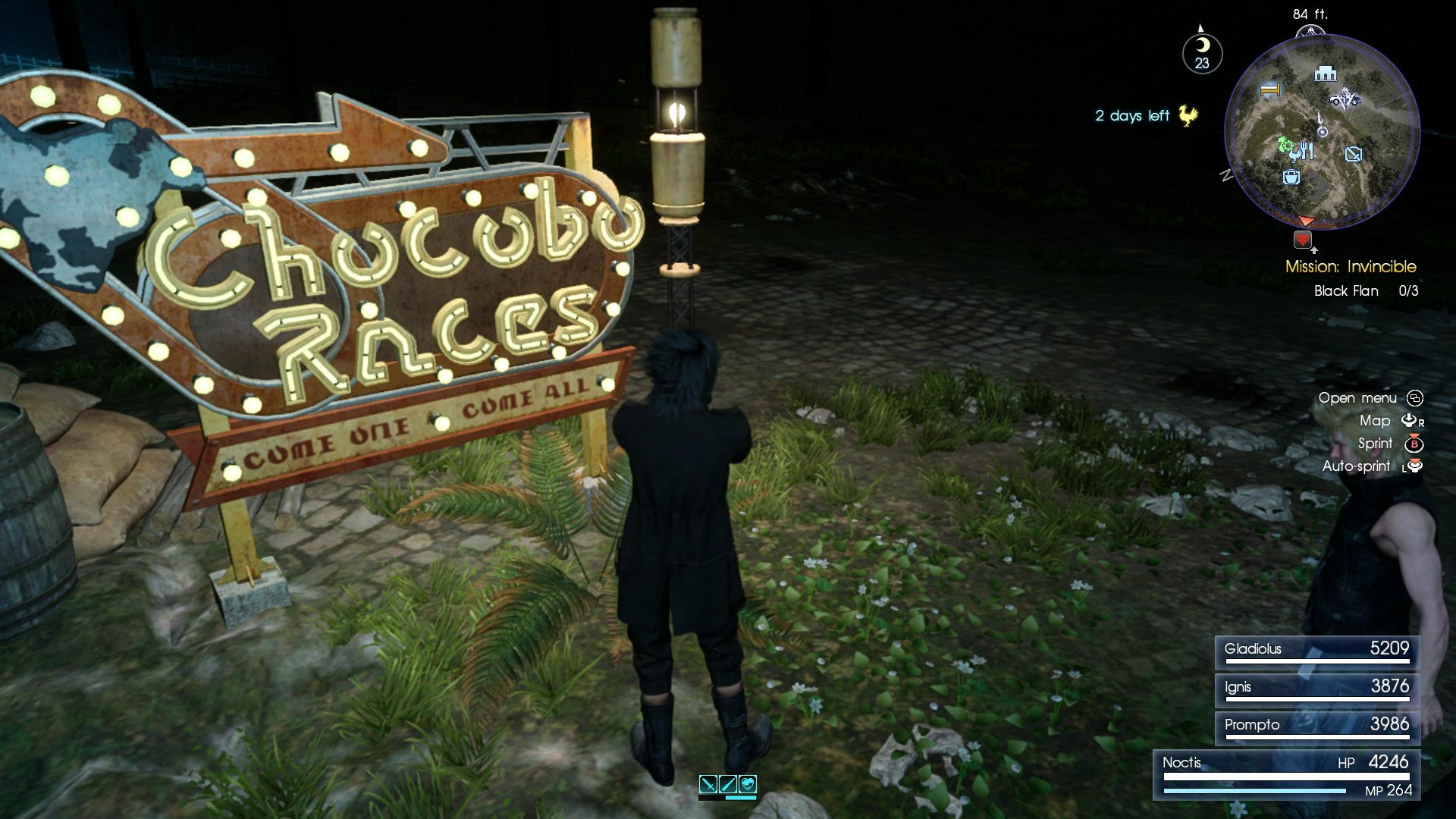
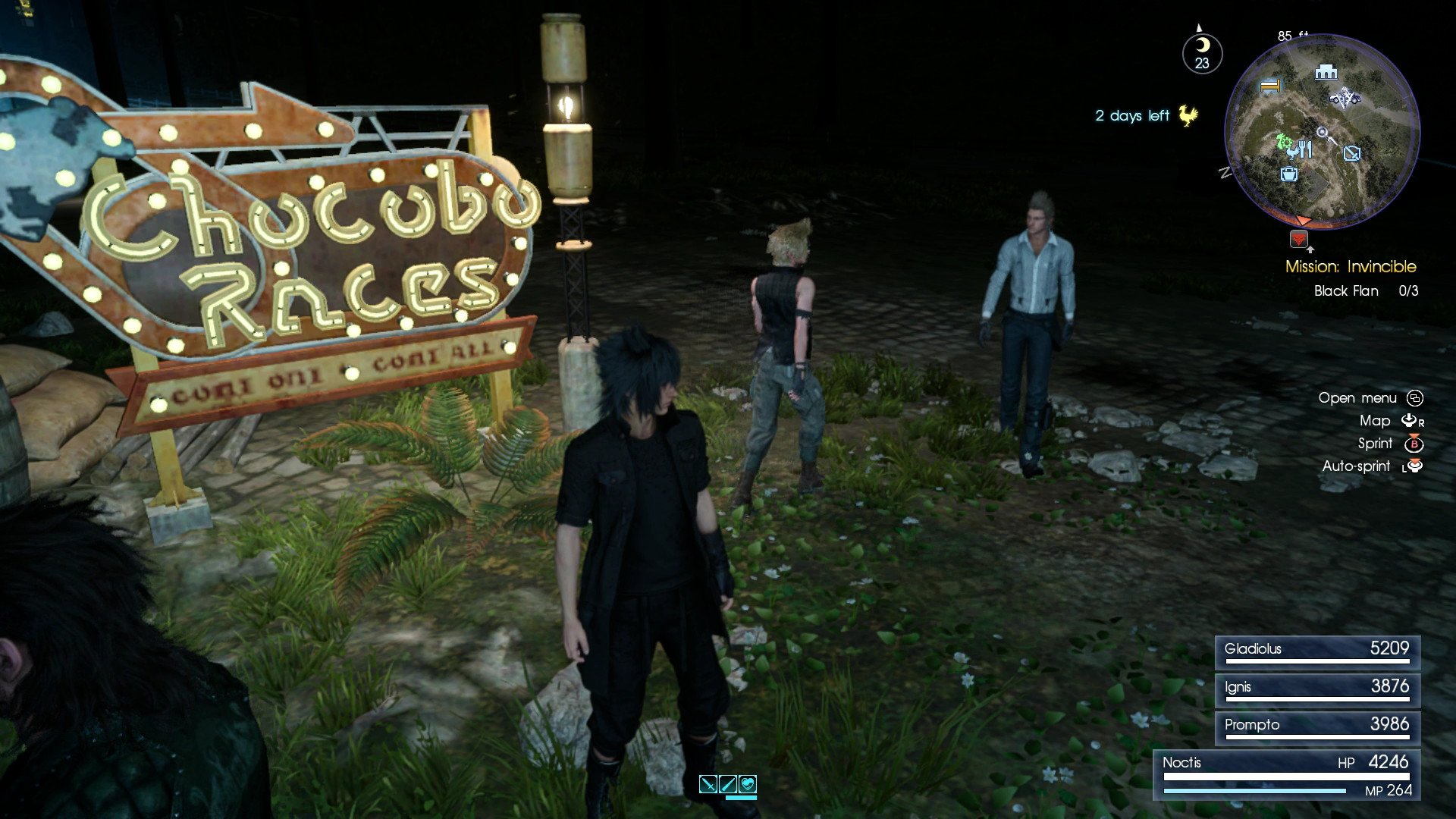
Still, for a game that has been in development for ten years, I think it's clear that at least some assets have been recycled from the PS3-era days where the game started life. It's easy to give FFXV some slack for the engine woes (which by the way, has crashed on me far more than any other non-beta Xbox One game I've played so far) because the music and sheer artistry beneath all that awkward tech are so infectious. When you ignore the issues, the magic effects are astonishing, the combat animations and interactions up close are the sort you expect to find in pre-rendered scenes, and the way music intertwines with the intensity of battle is pure majesty.
I hope that Project Scorpio will allow Final Fantasy XV to realize it's full potential with better hardware. The way Square Enix has optimized FFXV to run on current-gen hardware is too big of a compromise and does the art a huge disservice. It's simply frustrating. Thankfully, Final Fantasy XV makes up for it with some solid gameplay.
Putting the W in JRPG
Combat Gameplay
When I played the FFXV demo last year, like many, I lamented the death of Final Fantasy's turn-based predecessors. Hajime Tabata and his team are convinced that turn-based battle systems are outmoded, and as such, they opted to give FFXV a real-time combat system that riffs on hack and slash games. And like FFXV's visuals, the results are a bit mixed.
FFXV still retains many RPG systems players might expect, including hit points, stats, RNG, but it's strewn through the lens of an action RPG hybrid that rewards careful timing and quick reflexes. It's a little ironic that Square Enix considers turn-based combat to be outdated because they injected quick time events into FFXV's combat system, which often feel lazy. Thankfully, they're often a little more interactive in FFXV than some other games with hack and slash gameplay, allowing you to perform spectacular moves with well-timed parries and dodges.
It feels incredibly rewarding to pull off a fight without getting hit, purely based on your knowledge of the enemy alone.
At first, I felt that the combat system was clunky and unintuitive, but it opened up to me more as I played. Just because there's an 'X' button prompt on the screen doesn't necessarily mean you're strong enough to parry an attack, and the auto-dodge mode from holding down the same button isn't an invincibility switch. Sometimes dodge rolling is a far smarter option. As you play, you begin to learn each individual monster's attack animations and understand how best to respond. It feels incredibly rewarding to pull off a fight without getting hit, purely based on your knowledge of the enemy alone.
FFXV still throws plenty of curve balls at you during play, forcing you to change tactics. Like many Final Fantasy games, there are ways you can give yourself an advantage, using party healing Mega Elixirs or a party reviving Mega Phoenix. Their abundance makes it easy to cheese your way through difficult battles, though, which dampens the experience a little.
Sometimes monsters will come at you in groups. Sometimes there will be a new version of a familiar monster that's bigger, meaner, and uses different abilities. And of course, there's always those horrifying status effects (including being turned into a toad). Occasionally you will also face boss battles that range from the small and nimble to utterly gargantuan. FFXV has some of the largest and most spectacularly designed boss monsters I've ever seen in a game, and it feels incredible to slay them.
FFXV's combat still feels a little messy at times, though. While the effects are spectacular, the magic system is a little restrictive, forcing frequent trips into menus to switch out weapons and flasks mid-battle which impacts the flow of combat. Additionally, the camera is woefully inadequate, frequently getting stuck in trees and behind terrain, blocking the view of the battlefield entirely. The skill tree system doesn't really offer any form of customization either. It just rewards you for grinding, and doesn't really change the way you play in any significant way.
Of your 4-man party, Noctis is the only character that is directly controllable, while your three other companions generally mull around doing their own thing, frequently dying to area attacks. FFFXV's more difficult battles are as much about babysitting your companions — especially the incredibly weak Prompto — while making sure you're keeping yourself alive. It just feels a little silly, watching your companions stand in fire, never avoiding attacks, focusing your attention away from the epic spectacle and on the weak A.I. actions.
FFXV Armiger attacks are pretty spectacular. pic.twitter.com/hCP7iIjSWO— Jezzle (@JezCorden) 1 January 2017
Spending the Armiger bar allows you to fell enemies very quickly in a spectacular fashion.
Considering Dragon Age and even Final Fantasy XII allow you to control other party members, at least to some degree, not being able to control the rest of your party feels like the product of laziness rather than good design.
Not being able to control the rest of your party feels like the product of laziness rather than good design.
Omitting this functionality simply doesn't add anything to the game, it only subtracts.
Attacking monsters from certain angles grant partner link attacks that deal increased damage, which makes companion combat feel a little more rewarding. Taking actions in combat also build up a tech meter, which can be spent on partner attacks that deal huge amounts of damage, or grant powerful support abilities. Like magic, though, there's a limit on the amount you can have mapped to your controller at once, forcing you to interrupt combat to jump into menus frequently. I'm not sure why Square Enix didn't bother to add menus for tech attacks on the regular HUD, as it would have been far more intuitive.
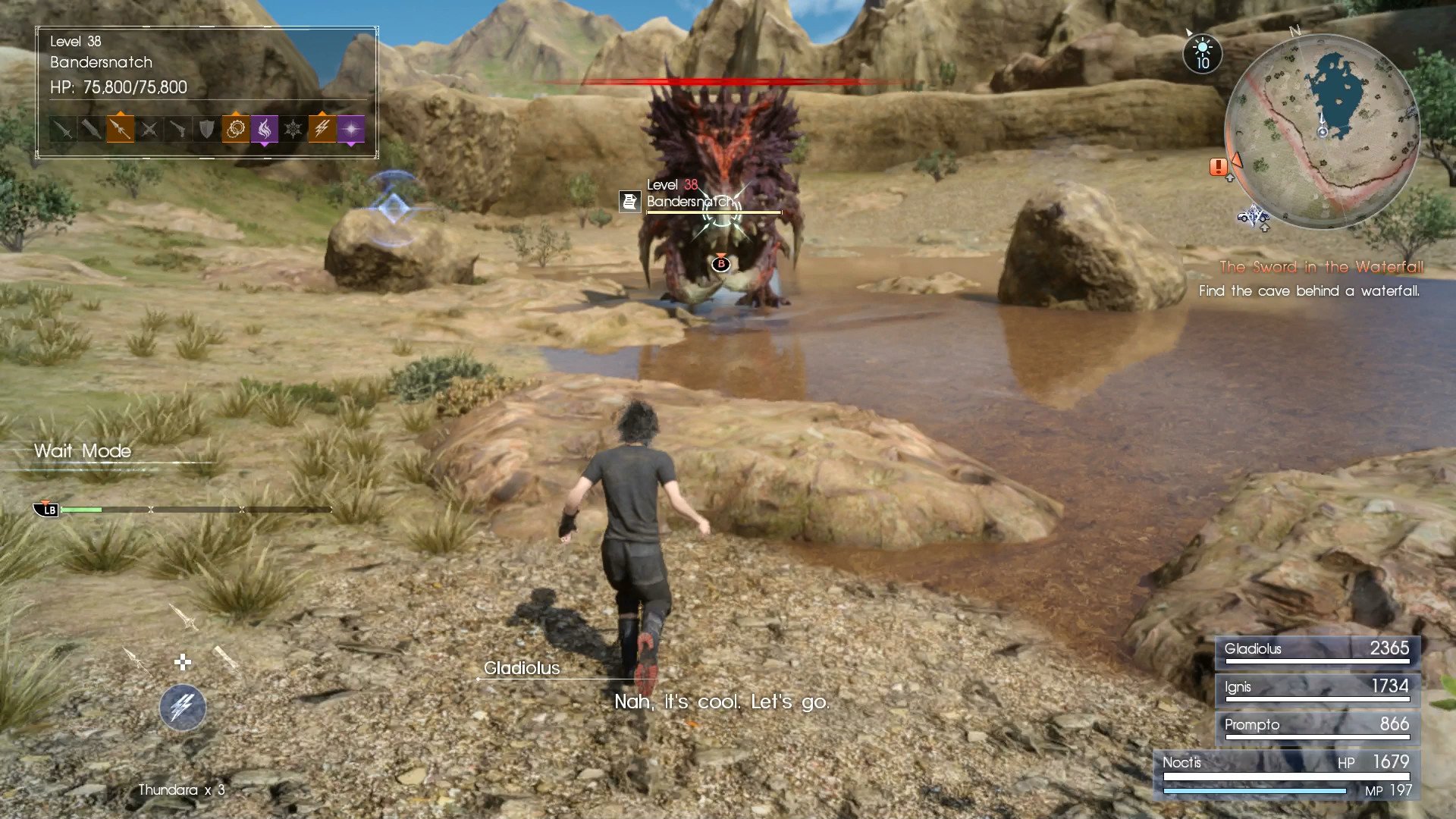
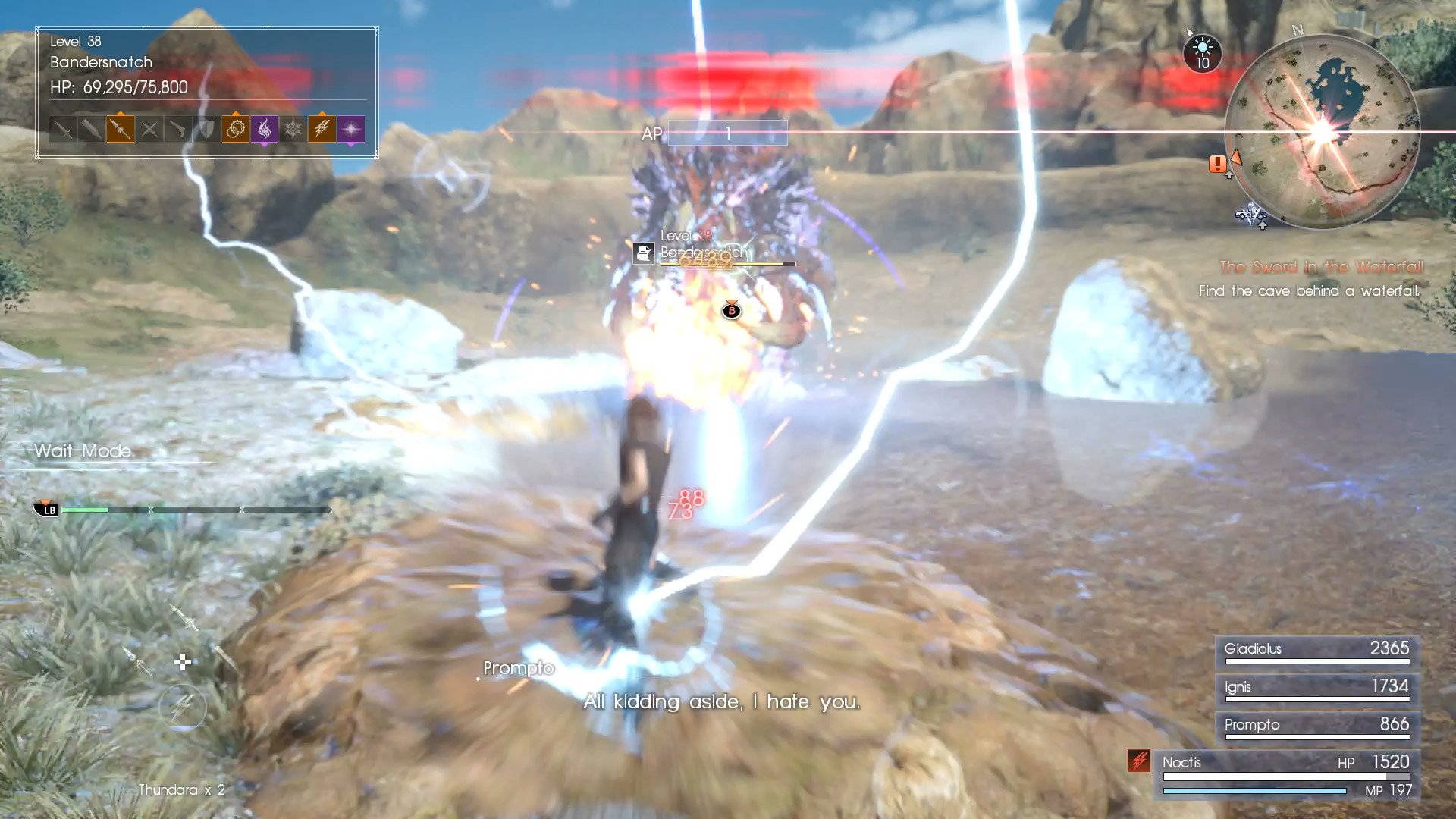
Overall, FFXV's combat system is a solid effort to modernize the franchise for today's audiences and expectations. Square Enix retains the most important elements of what makes Final Fantasy Final Fantasy, but I still feel FFXV could have featured more strategic elements to make it feel a little less spammy, and a little harder to simply cheese difficult fights, without hindering the flow of its real-time combat. I'm also disappointed at the lack of level scaling, as it's incredibly easy to out-level story content, making some of the game's most epic fights feel little more than interactive cutscenes. Most of my complaints with FFXV's combat boil down to quality-of-life issues, so hopefully some, at least, can be resolved with future patches.
Side quest city
Open World Gameplay
Judging by the scale of Final Fantasy XV's open world, I'd say Square Enix really took criticisms about FFXIII's linearity to heart. FFXV is huge, but they say size isn't everything.
Final Fantasy XV's world is atmospheric and well detailed with varying types of environments. Lush forests, dense swamps, volcanic plains, and bustling cities are all represented. It's pretty clear that FFXV has borrowed from the likes of Red Dead Redemption and The Witcher 3 when it comes to its open world, but it feels a little stunted when it comes to actual content density.
FFXV suffers from a Dragon Age Inquisition-like tendency towards utterly pointless side quests, where most of them hinge on fetching a glowing item place marker and tediously traveling back to the quest giver. The game's bounty hunters follow a similar pattern of context-devoid "go here, kill this, and return" too, which is a little underwhelming. The Witcher 3, it ain't.
Noctis and his companions travel between locations using the Regalia, a supercar that can be upgraded and customized in various ways. The Regalia is practically on rails, however, bound to the game's various highways and roads. If you want to traverse off-road, renting a Chocobo makes traversal far easier, and hey, riding a giant chicken creature is pretty fun too. Thankfully, at least, the game's fast travel systems make grinding a little less annoying, but the game's incredibly long load times only compound the sense of tedium.
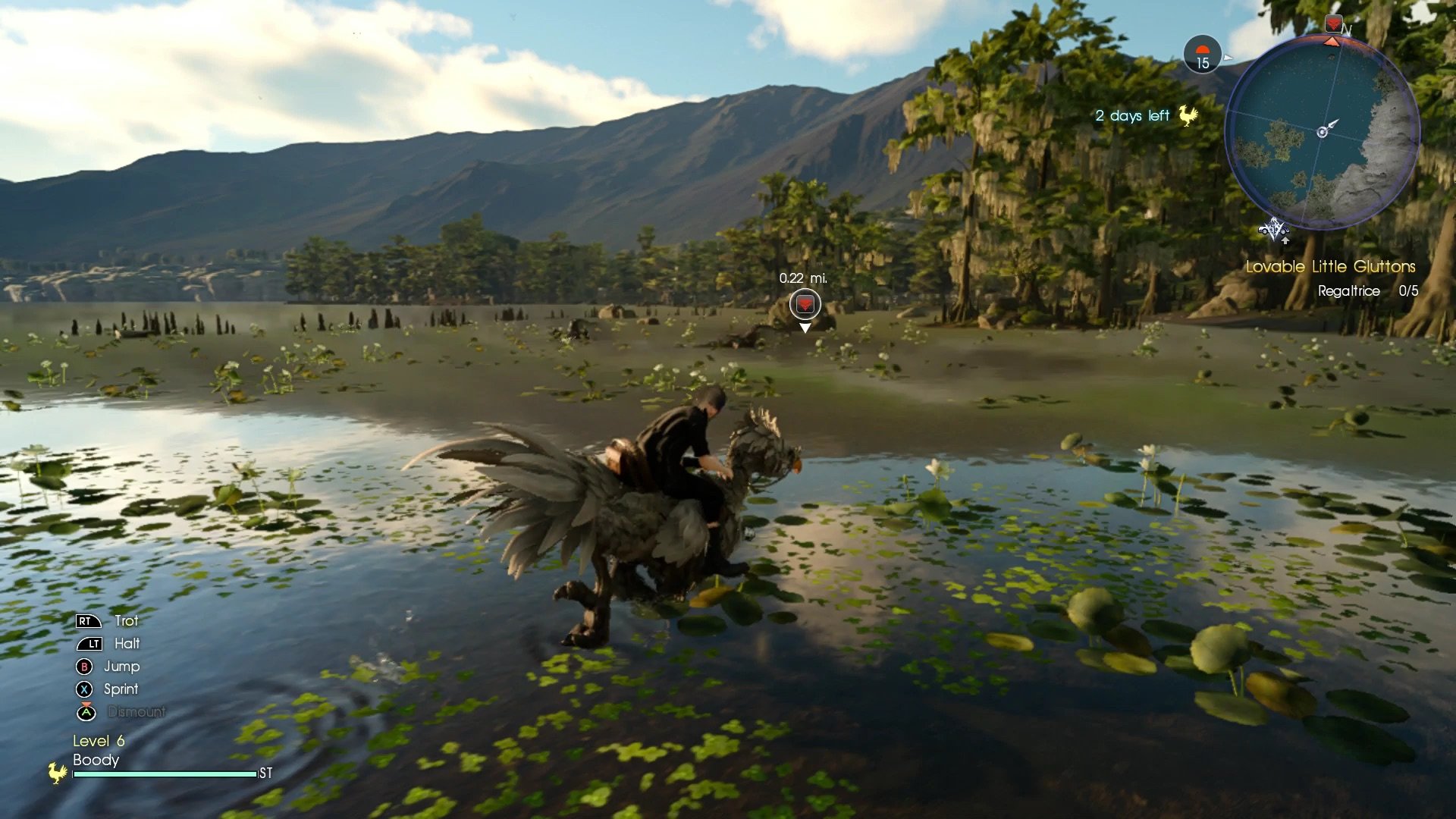
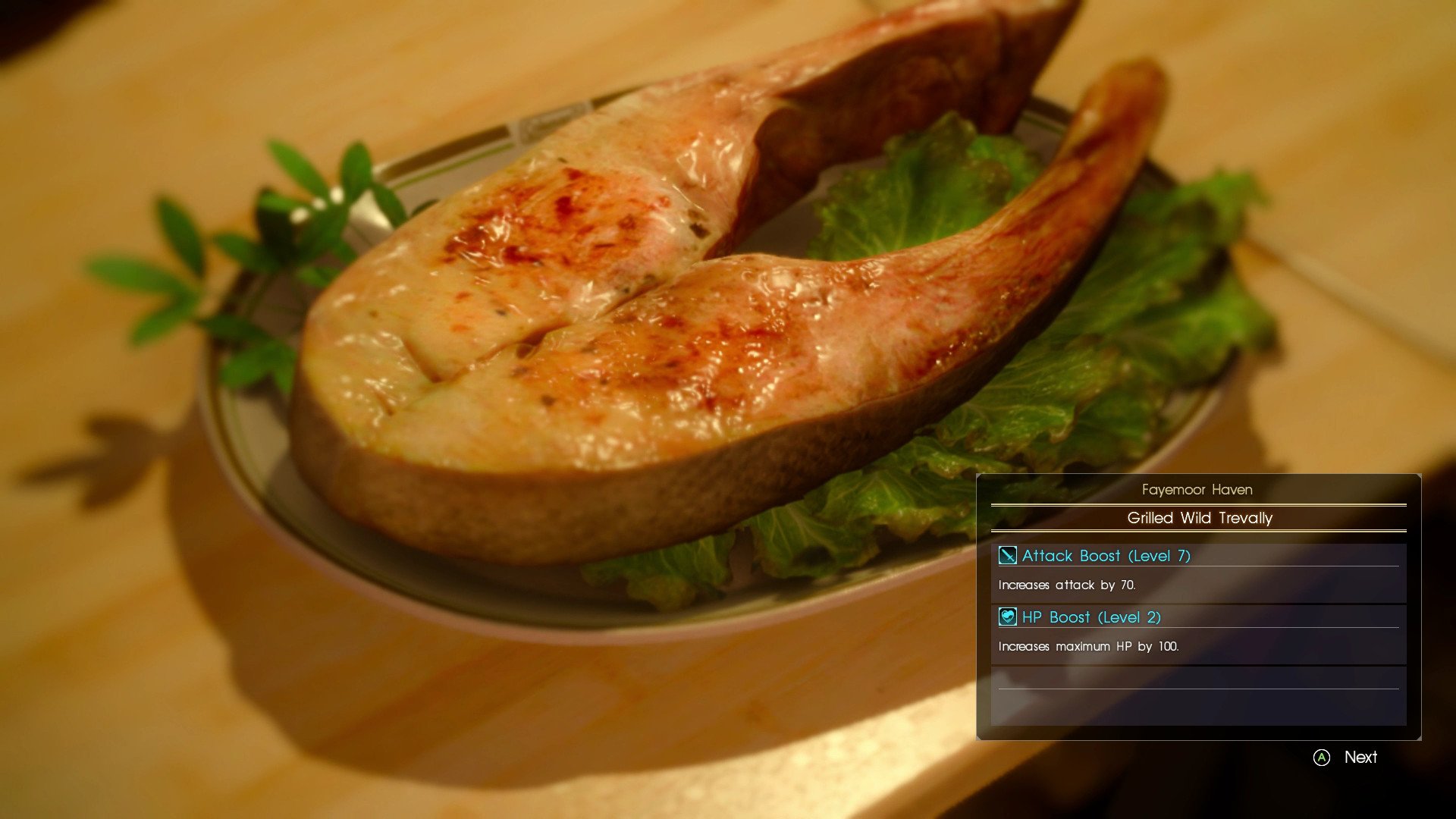
Every aspect of Final Fantasy XV comes attached with some form of progression system. Whether it's Ignis' campfire cooking, Gladiolus' scavenging skills, or Noctis' fishing abilities, each present an additional opportunity to grow your character in fun and strangely addictive ways. The fishing mini-game is surprisingly engaging, and the various stat-boosting cuisines Ignis can cook represent some of the most detailed and varied 3D food models I've ever seen in a game, and every new unlock just makes me feel greedy.
When certain aspects of a game are so good, the downsides stand out all the more. It's great that FFXV is non-linear, but there's just not a great deal of interesting content to explore. The few optional dungeons in the game are relatively brief, and the rewards never feel particularly pivotal or game-changing. Post-completion more dungeons open up, but they generally just provide the opportunity to fight familiar re-colored monsters again at a higher level, just for the sake of it. Disappointing.
There are simply better open world games out there, offering more meaningful content. FFXV's Eos feels as though it was designed first, and the quests, story, and context were shoved in afterward. Without spoiling the plot, there's a strange disconnect between the way Eos well-executed in gameplay, versus the way it's presented in the story. The meeting of modernity with magic is fun, but it's not always consistent.
Still, I have to commend Final Fantasy XV for the steps they did take in dragging the aging franchise into the modern era. I can firmly put bad memories of Final Fantasy XIII's corridor simulator behind me, and expect greater things from FFXVI, which will undoubtedly benefit from the wealth of feedback Square Enix are receiving on the current state of FFXV.
A Final Fantasy for fans and newcomers alike
Story Progression
Final Fantasy XV opens with the phrase "A Final Fantasy for fans and newcomers alike," and I feel that this couldn't be truer. The game is peppered with nostalgia, but it never goes overboard. FFXV is full of heavy drama, but it never lacks good humor. And best of all, it's characters are memorable and well developed. However, FFXV is far from perfect.
Final Fantasy XV attempts to tell a Lord of the Rings-like tale of fellowship and brotherhood, right down to the existence of a magical ring over which nations are willing to go to war. For the most part, Square Enix succeeds, but a disconnect between the game's open world, its gameplay, and its narrative serve to derail what could have otherwise been among the best Final Fantasy stories.
Prince Noctis of Lucis is spirited away near the start of the game to broker a peace treaty by marrying Lunafreya of Tenebrae, solving a stalemate that has left Lucis locked in a costly war with the Niflheim Empire.
Without spoiling the story for those who haven't played, as you might expect, things don't go to plan. Noctis and his personal guard, Prompto, Gladiolus, and Ignis, embark on a quest across the world to defeat the Empire and reclaim Lucis for his people and free the cities of Eos previously overthrown by Niflheim.
Lucian kings and queens have access to special powers, but Noctis has to receive blessings from various Gods and ancestors to wield the strength necessary to defeat Niflheim's superior daemon-subverting technology. Noctis and his friends travel far and wide hunting tombs, solving problems, and trying to find the whereabouts of Lunafreya, his childhood friend and betrothed.
Ardyn is up there with Final Fantasy's most nefarious villains.
Lady Lunafreya is an Oracle, whose bloodline grants the ability to commune with the Gods. Lunafreya and Noctis are bound by their abilities and their responsibilities, but the true state of Eos is hidden for the majority of the game, and that of the intentions of Ardyn, the Imperial Chancellor.
I'm of the opinion that a hero is only as good as their nemesis, and Ardyn is up there with Final Fantasy's most nefarious villains, with particularly stand-out English voice acting by Darin De Paul. It's clear from the outset that Ardyn has ill intentions, and he shows up at the most (or least) opportune moments to guide Noctis and his friends, presumably for his own ends. As a villain, Ardyn's goals and drives are surprisingly banal when compared to some of his metaphysical Final Fantasy predecessors. Perhaps that makes him all the more relatable, and all the more disconcerting.
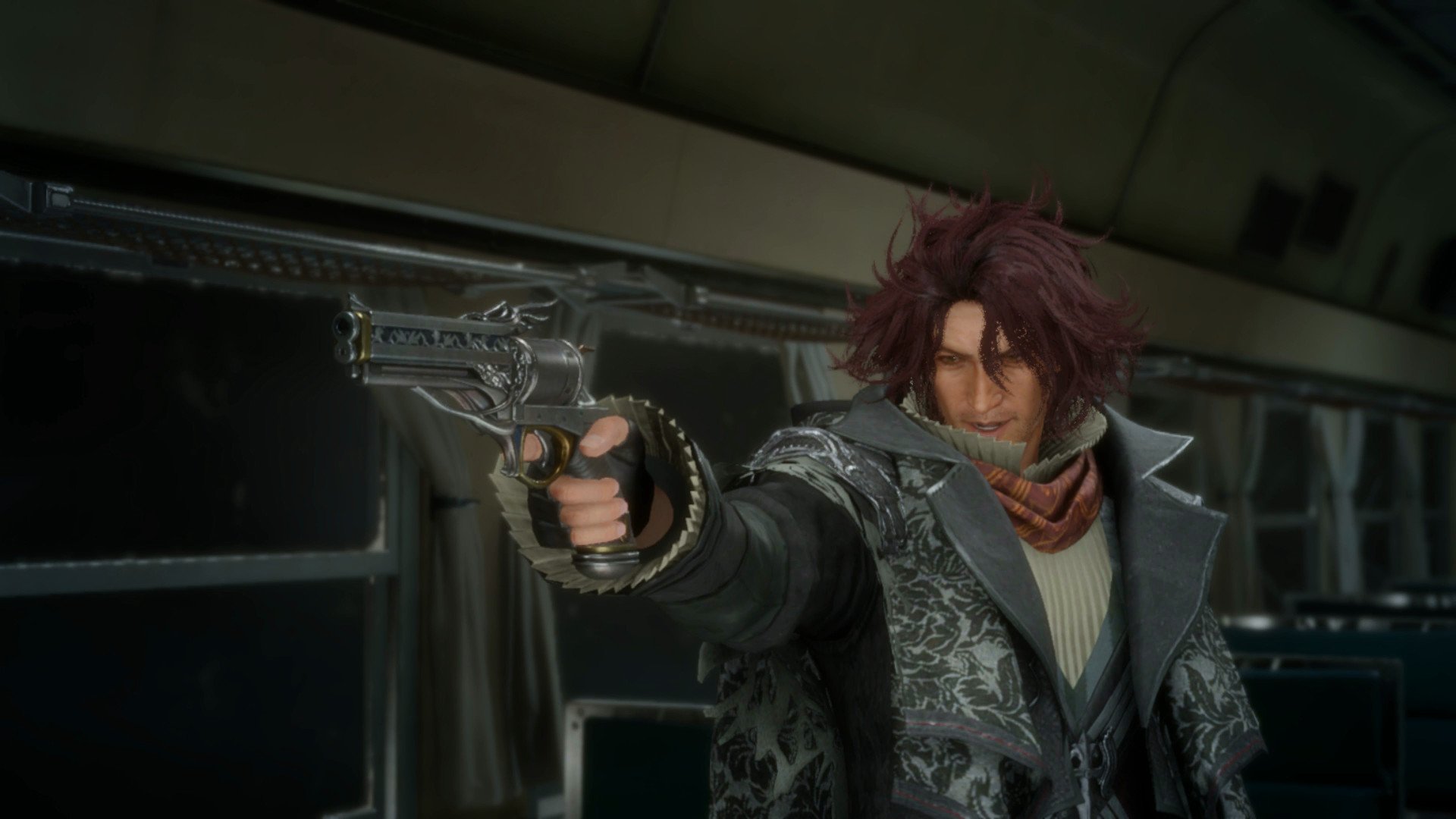
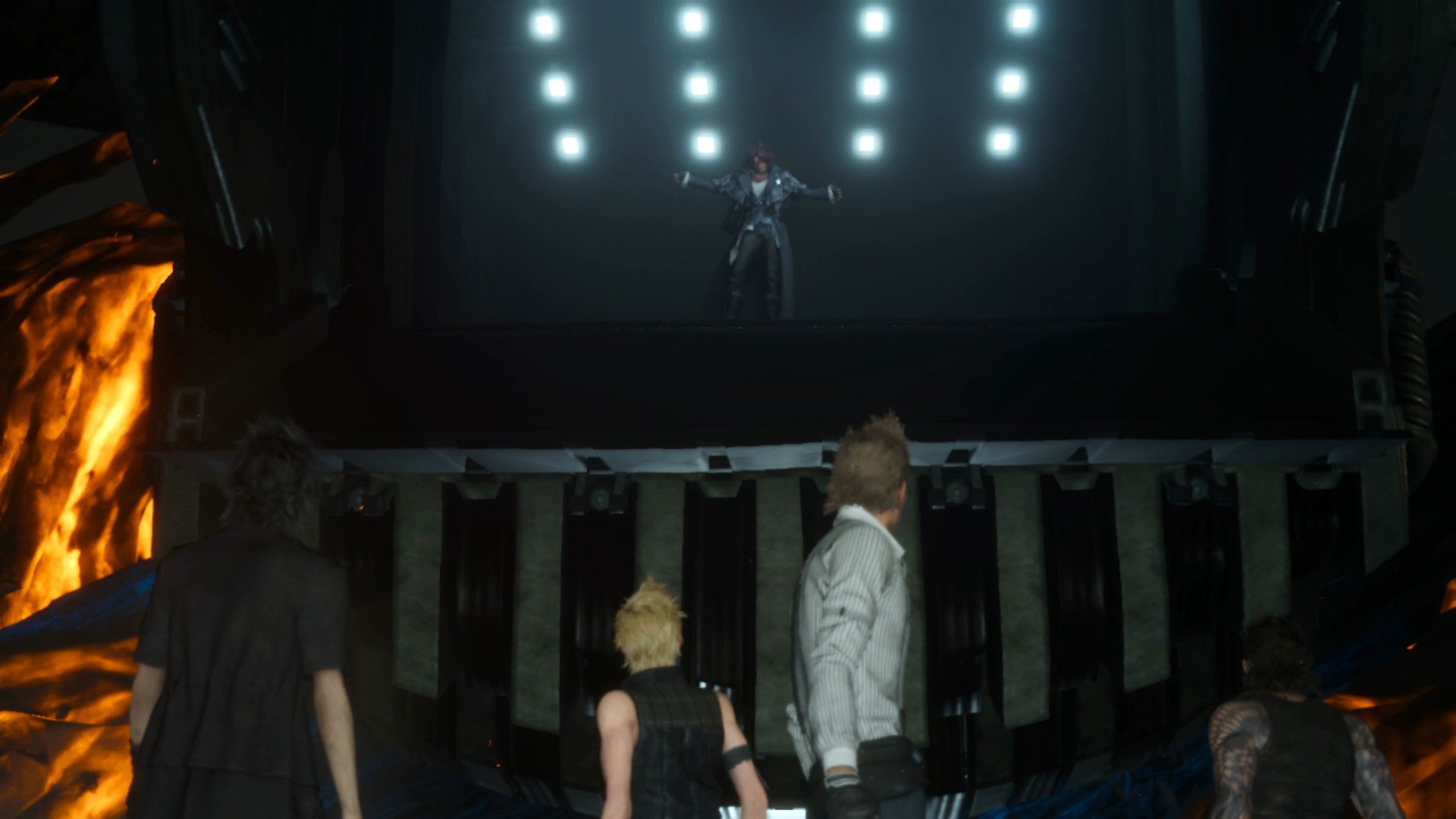
Without giving away too much, Final Fantasy XV weaves a relatively coherent plot that starts off a little slow, but builds towards more rapid pacing towards the end. The pacing becomes almost too fast in the final third of the game, as FFXV sheds its open-world gameplay and falls back into a linear format. During these chapters, FFXV loses clarity, and some pivotal details are easily lost if you're not paying extremely close attention.
There were a couple of occasions where it was only through obscure text files and even loading screen messages that I was able to keep up with what was going on. The nature of FFXV's world shifts as revelations about certain characters emerge, but important context is often missing, even after diving through wikis and forum posts.
It's hard to go into detail without spoiling it for those who haven't played, but Square Enix have acknowledged the awkwardness of the plot's closing chapters, and are even planning to update the game with new sequences to explain certain character's motivations, and why some of them change for seemingly no apparent reason.
FFXV's story was a fun trip, and has the elements of a solid plot, but the overall execution is weaker than it could have been.
Additionally, the rapid pacing of the story towards the end derails the build-up of certain factions and characters, neutering the impact some events might have otherwise had on an emotional level. Some sub-plots (particularly involving Prompto) seem thrown in there for the sake of it, or were ideas that were originally intended to receive more fleshed-out treatment, but ultimately didn't.
As I say, it's incredibly hard to explain the poor aspects of FFXV's story without spoiling the game, but all I can say is that FFXV's story seems disconnected, somewhat, with its world and its gameplay. It has some strong elements, which tie back to the franchise's traditions. It has some amazing set pieces, which will give you goose bumps.
FFXV's story was a fun trip, and has the elements of a solid plot, but the overall execution is weaker than it could have been.
A step in the right direction
Conclusion
Final Fantasy XV was a solid effort for Hajime Tabata and his team. Building Final Fantasy games for the modern era is no easy task, managing the expectations of its long-time fans, the standards of modern AAA games, and the way JRPGs have fallen out of the limelight. WRPGs like the Elder Scrolls V: Skyrim and The Witcher 3 have dominated the very meaning of the genre in recent years, and it's clear that reconciling the essence of Final Fantasy with the choice, breadth, and scale of modern RPGs was a difficult task.
FFXV mostly delivers. While it takes some getting used to, its combat is infectious and fun. Its artwork is utterly breathtaking, and some of its set pieces are awe-inspiring. Its characters are fun and memorable, and the plot is engaging enough to keep pushing you forward. FFXV trips over its own character lore on occasion, with key details either missing or poorly explained, but it's not enough to hinder the experience as a whole.
Pros:
- Fun, spectacular combat
- Breath-taking art, music, and set pieces
- Engaging characters
- Lots of content
Cons:
- Visuals restricted by engine quirks
- Side objectives are weak
- Story is poorly executed
RPG fans should definitely pick up Final Fantasy XV. It's a game you can seriously get your teeth into. Completionists will find plenty to do with New Game+ and optional bosses and dungeons to conquer, with even more on the way in the form of patches and DLC. If you're in it for the general experience and story, there are better titles out there, but it feels like truly great RPGs are few and far between these days.
As a long-time Final Fantasy fan, my key takeaway from FFXV is this: I am excited for the future of the franchise for the first time in years. Hopefully, Square Enix won't spend 10 whole years building FFXVI.
This review was conducted on Xbox One using a copy provided by Square Enix.

Jez Corden is the Executive Editor at Windows Central, focusing primarily on all things Xbox and gaming. Jez is known for breaking exclusive news and analysis as relates to the Microsoft ecosystem — while being powered by tea. Follow on X.com/JezCorden and tune in to the XB2 Podcast, all about, you guessed it, Xbox!
